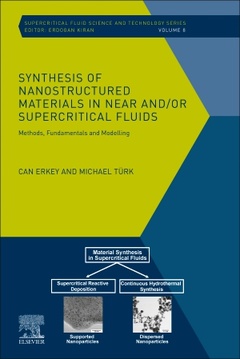Description
Synthesis of Nanostructured Materials in Near and/or Supercritical Fluids
Methods, Fundamentals and Modeling
Supercritical Fluid Science and Technology Series
Authors: Erkey Can, Turk Michael
Language: English
Subject for Synthesis of Nanostructured Materials in Near and/or...:
Keywords
organometallic compounds; coordination of compounds; transport properties; thermodynamics of mixtures; phase behavior; metal complexes; adsorption isotherms; adsorption of SCFs; synthesis of nanostructured composites; Supercritical Fluid Reactive; deposition; bimetallic and multi-component nanoparticles; metallic films; hydrothermal synthesis; thermal decomposition; SFRD Process; CTD Process; CHTS Process
282 p. · 19x23.4 cm · Paperback
Description
/li>Contents
/li>Readership
/li>Biography
/li>Comment
/li>
Synthesis of Nanostructured Materials in Near and/or Supercritical Fluids: Methods, Fundamentals and Modeling offers a comprehensive review of the current status of research, development and insights on promising future directions, covering the synthesis of nanostructured materials using supercritical fluid-based processes. The book presents fundamental aspects such as high-pressure phase behavior of complex mixtures, thermodynamics and kinetics of adsorption from supercritical solutions, mechanisms of particle formation phenomena in supercritical fluid-based processes, and models for further development. It bridges the gap between theory and application, and is a valuable resource for scientists, researchers and students alike.
1. Introduction 2. Compounds of interest 3. Fundamental aspects of pure supercritical fluids 4. Thermodynamics of mixtures of metal complexes with supercritical fluids 5. Thermodynamic and kinetic of adsorption of metal complexes on substrates from supercritical solutions 6. Synthesis of nanostructured composites of metals by Supercritical Fluid Reactive Deposition (SFRD) 7. Synthesis of metal-oxide nanoparticles / films 8. Modeling of Particle Formation in Supercritical Fluids 9. Future Research Needs and Developments
Chemical engineers, materials scientists, chemists and physicists from both, academia and industry. The book could be used for a graduate level course on supercritical fluids.
Michael Türk received his Dipl.-Ing. degree in Chemical Engineering from the Universität Karlsruhe (Technische Hochschule). In 1993 M. Türk completed his PhD thesis in the field of thermodynamic properties and intermolecular interactions of binary gaseous mixtures. In his professorial dissertation of 2001 a theory was proposed allowing understanding of the relationship between process conditions and the properties of organic particles produced by supercritical fluid based processes.
His current research activities are focused on the use of supercritical fluids (mainly CO2 and H2O) as media to prepare organic, inorganic and metallic materials by physical transformation or chemical reaction and the development of new, energy-efficient and environmentally-friendly strategies to create novel products with extraordinary performance for pharmaceutical, energy and biomedical applications.
So far, M. Türk has authored 125 articles (including 13 book chapters); has graduated 20 PhD students (10 as supervisor and 10 as co-advisor) and more than 50 Diploma / Master and 15 Bachelor students.
- Includes thermodynamic and mass transfer data necessary for industrial plant design
- Explains the mechanisms of reactions in a supercritical fluid environment
- Lists numerous industrial processes for the production of many consumer products




